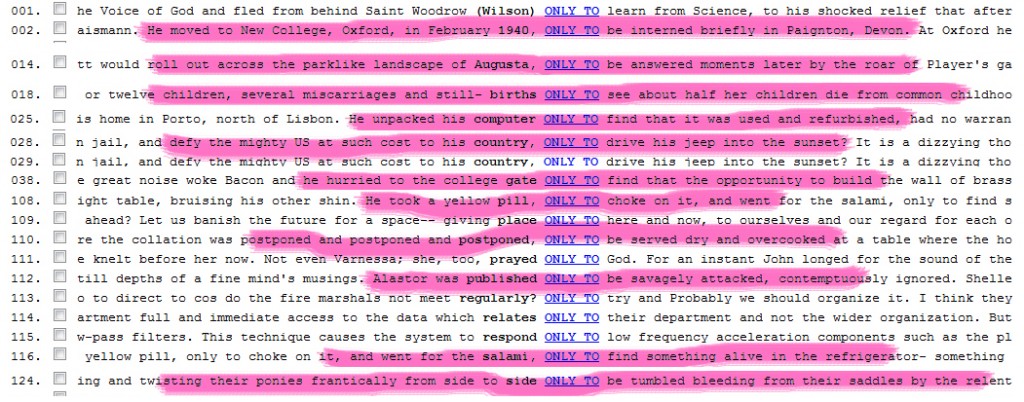 Once in a while, I come across a sentence (from an article, a textbook or even my own mouth) that includes a structure that gives me pause. I look at it, wondering if I’ve ever taught it before, if it appears in any textbook units I’ve taught from. I don’t always notice them as they slip by me, but today, I did. It’s only to.
Once in a while, I come across a sentence (from an article, a textbook or even my own mouth) that includes a structure that gives me pause. I look at it, wondering if I’ve ever taught it before, if it appears in any textbook units I’ve taught from. I don’t always notice them as they slip by me, but today, I did. It’s only to.
There is more than one situation where we see only to. Think about it for a second. What examples come to your mind? Write a few example sentences down. I wonder if one of them will be the one I’m referring to. Once you’ve written down a few sentences, scroll down.
How about this one?
a. Like all the great airports, it dates back ONLY TO the last days of the Second World War.
Here, it’s being used to intensify the amount, the last days, in terms of how surprisingly short it is. But no, this isn’t the use I was referring to.
Next?
b. “Don’t sure ’nuff me, officer. I’m honey ONLY TO my husband, understand”?
In this one, it’s being used to describe the singularity of an action’s receiver. And again, no, this isn’t the use I mean.
One more for good measure…
c. Amy had to be safe, had to come back to them… if ONLY TO give her parents another chance to do better by her.
This one’s showing the action in the condition may be the one reason to do something. Once more, it’s not the one I’m focused on.
All these above appear in either Dictionary.com (which I tend to use the most), but not the one I was interested in. I decided to check out the corpus, so I went to
Compleat Lexical Tutor and queried a concordance using Brown’s, BBC Spoken and BBC Written corpora with ONLY TO and got this: 136 entries where ONLY TO appeared next to each other. Reading through them more closely, it turns out that the one I was pondering was used 11 times. That’s 8% of the time. Not too much, really. So what is this mystery construction? Here’s the sentence I originally came up with:
I went to the classroom only to realise that I’d left my handouts in my office. And these are the corpus results:
Was it like one of the example sentences you wrote from the beginning of this post? I don’t think if I’d been asked to, it would have been mine. Here, it’s being used to demonstrate an unfortunate result or action that occurred after another. The fact that I’d just noticed it myself, can’t recall ever explicitly teaching it to anyone nor remember it from my textbooks and that it wasn’t an entry in Dictionary.com bring me to believe it’s not that frequent.
Upon further investigation, where I did find it, however, was Oxford Dictionary online and a mention by Tim Bowen on Onestopenglish. Maybe I’d better consider switching online dictionaries. I’m sure it exists elsewhere too in the depths of Practical English Usage or some other treasure.
Are there any peculiar structures or usages that you’ve noticed that don’t seem to be mentioned much (written, spoken or in textbooks)?


Just for the record, one of the sentences I wrote down (yes, I am like that, I follow orders ;-)) was with a similar use to yours 🙂
I got to the movies only to notice I had left my glasses at home.
But I do realize it is unusual. Most commonly replaced with “just”. Are we, as ELT teachers using language that’s not colloquial anymore?
Still pondering about your question, though I am sure there are plenty.
Good one, Ty.:-)
Is “only to” colloquial? or is “just”? I tried out your replacement – “I got to the movies just to notice I had left my glasses at home” and it doesn’t sound right. I think I normally may just break it with a conjunction. Something like:
I got to the movies, and then realised I’d left my glasses at home.
Merci for giving me your two cents, Ceci. =)
Thanks for revealing the contents of your (almost) secret sentence, Tyson; i thought i was the only one to do that! Re: Cecelia’s comment on colloquialisms, i was reminded of Jack Richard’s plenary talk at JALT last year where he mentioned a relative asking a foreign student “What brought you here?” and the student answering “First a bus, then a ferry, then an airplane…” BTW, do you use corpus research in the classroom?
I have used it once or twice, particularly through Lextutor, but not that often, really. It doesn’t fit so much in with reading and finding a practical way to use it with writing isn’t as easy as you might think. I have a colleague who more extensively uses it in a lexical syllabus.
This is interesting to think about, Tyson. The first use of ‘only to’ that came to mind was the one that started you on your investigation. Unlike Cecilia, I didn’t write it down but it was something along the lines of “I walked all the way to the top of the town, in the rain, only to find that the shop was closed for lunch!”
And, because I didn’t write them down, I can’t remember the other uses that came to mind, (I’ll try to be more conscientious next time!)but they weren’t the first two you give.
I don’t think that this use of ‘only to’ is unusual. I think it will be used readily in stories where there is a disappointing turn of events. And, I think it probably caught your attention and was the first example that came to my mind because it is a set phrase to express the particular meaning. In your first two examples, the ‘only’ and the ‘to’ don’t need to be together. We could equally say/write “it only dates back to the…” or “I’m only honey to my husband” and your third example sentence, we need ‘if’. That’s why, I think, that when you ask how do you use ‘only to’, I think of the one you originally noticed.
I can’t remember ever teaching it either, but now that you’ve pointed it out, I’ll look out for opportunities to bring it to students’ attention. Thanks!
And, thanks for the distraction. I enjoyed that but I’d better stop rambling and go do something more productive 🙂
Yes, you’re probably right, Carol, when you suggest that those other examples can become split uses. However, “I’m only honey to my husband” might change the meaning from only him calling you ‘honey’ to ‘honey’ being the only name he calls you.
What I also noticed was that they can also be reversed in those examples: “I’m honey to only my husband.”
So, what productivity did you accomplish besides exploring language today? 😉
You’re right about the change in meaning there. Good point.
I also like the way you’ve adapted the meaning of ‘productivity’ ;). Besides exploring language, I went food shopping, did laundry, threw some things out, watched a couple of the IHDOS presentations, walked the dog, ate, and went to a film, all the while, forgetting to take a photo for my photo a day project!
(Hmm, ‘all the while’, don’t think I’ve ever taught that either. 😉
See how language just comes up when you’re aware? 😉 ‘All the while’ is a great phrase and definitely one to add to the peculiar phrase book for teaching.
Sounds like you did a lot, even if you forgot your photo. Take a bunch of interesting ones that week and then you can fill up boring days with extras lying around. I say as long as it’s within the same week, ‘same diff’. <--another?
Believe it or not, but only to being used to describe an unfortunate result is what I thought of before scrolling down:
“we got there only to find that all the tickets had been sold out”.
I think http://www.dictionary.com is just not a good dictionary when it comes to teaching / learning English. It’s a dictionary aimed at native speakers and it does not provide the information learners need to know about a word: collocations, colligation (grammatical patterns) etc. like Cambridge Dictionary Online or Macmillan. These dictionaries use natural, contextualised examples drawn from corpora. The latter by the way has an example of “only to” used for “unfortunate result”: “I tore open the box, only to discover that some of the parts were missing”.
Unfortunately, like Caron, I don’t remember teaching this use of “only”, but I’ll introduce it to my students when an opportunity presents itself in future.
Other peculiar usages that are not mentioned much? Hmmm… Perhaps “attitude” used to describe over-confident bordering on rude behaviour as in “Don’t give me attitude” or “Can you can drop the attitude?” is rarely featured in dictionaries. Generally, discourse markers characteristic of spoken language, such as mind you, though, come to think of it are usually under-represented in ELT materials. If you’re interested see the post on Spoken Grammar on my blog.
I am glad you find time to blog and don’t cease to give us food for thought in the midst of your busy MA studies. Or was this prompted by a paper you were working on?
LEO
Those are some other good choices, Leo. Once in a while a set phrase like any of those strikes me and I try to note it for teaching. I do like your Spoken Grammar post.
As for dictionaries, I think I’ll move on to either the Oxford one I mentioned in the post or either of those you mentioned.
Loved this intriguing article. I had the “only to” sentence right in my mind when I started reading, but hadn’t noticed before the use of the third kind, letter c. Will pay more attention from now on. I can think of the expression “there’s only too much I can tell you.” as tricky expression. Not that this is rarely said at all, in fact it is said more often in spoken than in written language. But I do not remember seeing any significant material about this to teach students. It is a very odd construction for most foreigners and I can understand why. It should be on textbooks more often. Thanks for this!
Thanks for the comment, Allan. Honestly, I don’t recall ever using your example of “only too much”.
Oh, maybe because “There’s only SO much” is more common. But “TOO much” is commonly said too. It means the opposite. “There’s only so much I can do about this.” = “There is nothing I can do about this.”
Yes, I’m vaguely familiar with its meaning and usage. I just don’t think we (Canadians) say it very much, if at all, for that meaning.
Interesting discussion.
I always use the British National Corpus (https://www.natcorp.ox.ac.uk/) to check usage and frequency. And I always recommend the site to my higher level students, particularly exam classes.
I also thought of your usage before reading the other sentences although I didn’t write it down. The BNC has 306 entries for “only to find” which to me sounds the most natural.
You’re probably right! “Only to find” does sound like one I’d use most often.